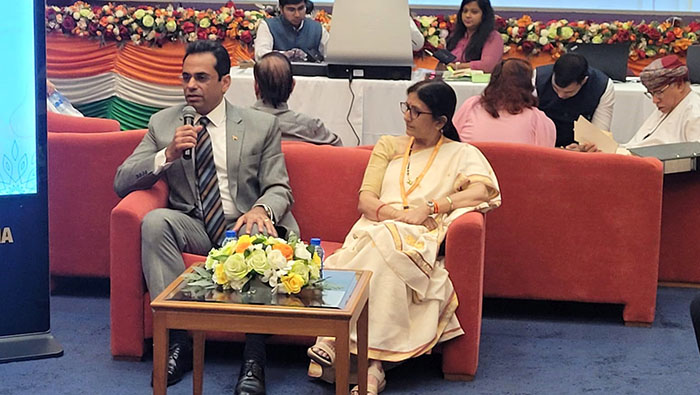
Muscat: The soiled and yellow papers were more than a century old. As officials carefully handled the delicate documents, history was told in its own way. Be it a document from 1838, a trade document from 1927, or a 1961 invitation to an Indian Embassy event, hundreds of documents from the 19th and early 20th centuries were scanned and saved at the Indian Embassy in Muscat over the past ten days.
The personal documents of the Indian diaspora digitised reached more than 7,000 at the end of the maiden project on Monday.
This unique project, conducted by the Embassy of India, Muscat, in association with the National Archives of India (NAI), also received support from the National Records and Archives Authority (NRAA) of Oman.
At a media briefing on Monday, Amit Narang, Indian Ambassador to Oman, said: “This is a unique initiative that showcases the rich history and trade ties between India and Oman. We are happy to receive more than 7,000 documents from 32 Indian families from Gujarat, who have been in Oman for over a century.”
He added: “It was a meticulous exercise to archive historical documents of the Indian diaspora living in Oman but I am happy that we have done it and it will be up for viewing after some time with the National Archives of India.”
Called ‘The Oman Collection – Archival Heritage of the Indian Community in Oman,’ this special digitisation and oral history project was conducted at the Embassy of India premises in Muscat from May 19-27, 2024.
The success can be measured by the fact that the 32 prominent Indian families offered a treasure trove of their personal documents, with their presence in Oman spanning several generations and going back 250 years.
This was the first overseas project of the NAI for digitising and archiving diaspora documents, marking an important step in preserving the history and heritage of the Indian community abroad.
Another important initiative, according to Ms. Kalpana Shukla, Deputy Director at NAI, was recording oral histories and digitising them in Oman.
“This is the first time that we have decided to do oral digitising and I had the chance to meet families and record ten senior members of the family. It was wonderful to know how Omanis and Indians lived in such harmony and trusted each other when it came to business and trade matters,” said Kalpana, who was accompanied by J.K. Luthra, IT expert at the NAI.
These firsthand narratives capture a wide range of stories, including personal anecdotes, migration experiences, and the evolution of the Indian community in Oman over the decades, which are expected to enrich the archival records.
Record number of documents digitised
During the project, over 7,000 documents in English, Arabic, Gujarati, and Hindi from the private collections of the old Indian merchant families were scanned and digitised.
The wide variety of documents digitised include personal diaries, account books, ledgers, telegrams, trade invoices, passports, citations, letters, correspondences, and photographs that shed a fascinating light into the lives and contributions of the Indian community in the Sultanate of Oman.
These documents collectively constitute a vivid narration of the history of the Indian community in Oman, including their cultural practices, social activities, trade and commerce, as well as their contributions to and integration into Omani society, and the preservation of Indian traditions abroad.
The digitised documents will be archived and uploaded on ‘Abhilekh Patal,’ the digital portal of the NAI, making these documents available to researchers and the wider public.
Private collections of the following Indian/Indian-origin families have been digitised: Ratansi Purshotam family, Khimji Ramdas family, Haridas Nensey family, Bhanji Haridas Mundrawalla family, Naraindas and Shanta Toprani family, Maganlal Manji Vyas family, Vijay Singh Veljee Pawani family, Lakhoo’s Ved family, Chimanlal Chhotalal Surti family, Jayantilal Wadher family, Kanojia family, Ramesh Khimji family, Visoomal Damodardas family, Vijay Singh Purshotam Toprani family, Jamnadas Keshavji family, Naranjee Hirjee family, Velji Arjun Pawani family, Purshotam Damodar family, Pandya family, Meghji Nenshi family, Shah Nagardas Manji family, Ajit Khimji family, Khatau Ratansi Toprani family, Ratanshi Gordhandas Bajaria family, Harshendu Hasmukh Shah family, Khubo Gurnani family, Mohanlal Arjun Pawani family, Dhanji Moraji “Shabica” family, Ebji Sundardas Asher, Dharamsey Nensey, Kiran Asher family, and Bakul Mehta family.
In a statement to media from India, Arun Singhal, NAI Director General, remarked: "This is the first time that we have collected and digitised the private archives of diaspora documents from abroad. This marks a historic milestone for the NAI and a significant step towards preserving the rich heritage and narratives of the diverse overseas Indian community.”
At the press briefing on Monday, Narang said: "This project aligns with Prime Minister Shri Narendra Modi Ji's vision to strengthen connections with the Indian diaspora worldwide. By documenting and preserving the history of the Indian community in Oman, we are rekindling a vital part of our shared heritage and fostering a deeper engagement with our diaspora.”
Sheikh Anil Khimji, head of the Indian community in Oman, expressed his appreciation for the project.
He said, "We thank Prime Minister Narendra Modi and External Affairs Minister Dr. S. Jaishankar for their vision of engaging and connecting with the Indian diaspora. The archiving of the historical documents of the Indian diaspora by the Embassy of India will go a long way in preserving their history and in doing so also showcase the time-tested bonds of friendship between India and the Sultanate of Oman.”
Oman’s NRAA supported the project by providing essential logistical and other support, ensuring its smooth execution. In addition to preserving historical records, the digitisation project seeks to foster a more focused engagement with the Indian diaspora community in Oman and will promote a better appreciation of the longstanding India-Oman friendship. The project will facilitate better research about the Indian diaspora's development and contributions and will serve as a valuable resource for future generations.